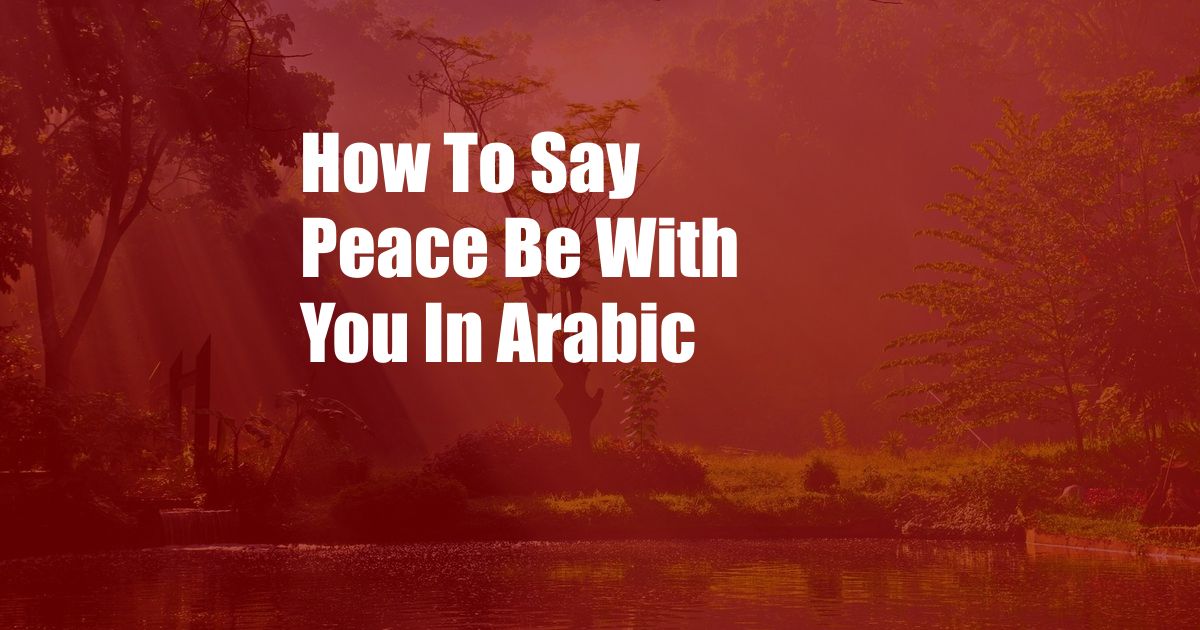
How to Express “Peace Be with You” in Arabic: Exploring the Nuances of a Timeless Blessing
As I stood amidst the bustling streets of Marrakech, enveloped in the vibrant tapestry of Moroccan culture, a simple yet profound exchange sparked within me a quest for understanding. A passerby, his eyes crinkled with warmth, greeted me with the phrase “Peace be with you,” invoking within me a sense of tranquility and respect.
Intrigued by the depth of this salutation, I embarked on a journey to delve into its origins, meaning, and cultural significance. In this article, we embark on a comprehensive exploration of how to say “peace be with you” in Arabic, unraveling the rich history and nuances of this enduring expression of goodwill.
The Arabic Roots of “Peace Be with You”
As-salamu alaykum
The Arabic phrase for “peace be with you” is “as-salamu alaykum.” It is derived from the root word “salaam,” which encompasses notions of peace, safety, well-being, and submission to God. By uttering this phrase, one extends a heartfelt wish for the recipient’s tranquility, both physically and spiritually.
In the Islamic context, “as-salamu alaykum” holds significant importance. It is a customary greeting, a religious invocation, and a powerful reminder of the interconnectedness of all beings. Its usage transcends religious boundaries, as it is also employed as a warm salutation among non-Muslims in Arabic-speaking regions.
Variations and Context
The phrase “as-salamu alaykum” is often accompanied by additional words or phrases that further convey the speaker’s intentions and respect. Here are some common variations:
- As-salamu alaykum wa rahmatullahi (Peace be upon you and God’s mercy)
- As-salamu alaykum wa rahmatullahi wa barakatuh (Peace be upon you, God’s mercy, and blessings)
- As-salaam alayka (Peace be upon you – used when addressing a single person)
- Al-salaam alaykum (Peace be upon you all – used when addressing a group)
The choice of variation depends on the context and the level of respect or formality desired. For example, the longer, more comprehensive variations are typically used in religious settings or when addressing elders or individuals in positions of authority.
The Etiquette of Responding
When someone extends the greeting “as-salamu alaykum,” it is customary to respond with the phrase “wa alaykum as-salam” (and peace be upon you). This brief yet meaningful response conveys reciprocation of the well wishes and a shared desire for harmony and tranquility.
In addition to the verbal response, it is also considered polite to make eye contact and smile when exchanging this greeting. These gestures further enhance the sense of connection and mutual respect between the individuals involved.
Modern Trends and Developments
In recent times, the phrase “as-salamu alaykum” has gained increasing popularity in Western and non-Arabic speaking countries. It is often used as a symbol of interfaith dialogue, peace promotion, and cultural understanding.
The widespread adoption of this greeting reflects a growing desire for unity and a recognition of the shared values of peace and respect across different cultures and religions. Social media platforms and global events have further contributed to its dissemination, fostering a sense of global community.
Tips and Expert Advice
To effectively communicate peace and goodwill using the phrase “as-salamu alaykum,” here are some tips to consider:
- Use the appropriate variation for the context and audience.
- Pronounce the words clearly and with sincerity.
- Maintain eye contact and smile when exchanging the greeting.
- Be respectful of cultural norms and customs.
- Use the greeting as an opportunity to build connections and promote understanding.
By following these guidelines, you can ensure that your use of “as-salamu alaykum” reflects the true spirit of peace and harmony it embodies.
Frequently Asked Questions
- Q: What is the difference between “as-salamu alaykum” and “shalom aleichem”?
A: Both phrases mean “peace be with you,” but “as-salamu alaykum” is used in Arabic-speaking regions, while “shalom aleichem” is commonly used in Hebrew-speaking contexts.
- Q: Is it appropriate for non-Muslims to use “as-salamu alaykum”?
A:
Yes, it is perfectly acceptable for non-Muslims to use this phrase as a respectful greeting or expression of goodwill. - Q: What should I respond if someone greets me with “as-salamu alaykum”?
A: The customary response is “wa alaykum as-salam,” followed by a smile or other gesture of respect.
Conclusion
Expressing peace and goodwill through the phrase “as-salamu alaykum” is a beautiful and profound way to connect with others and build bridges across cultures. By understanding its roots, variations, and etiquette, we can use this timeless greeting to sow seeds of harmony and create a more peaceful and just world.
Did you find this article informative and engaging? Let us know in the comments below if you have any questions or would like to share your own experiences with using the greeting “peace be with you.”